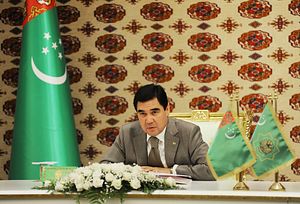Gurbanguly Berdimuhamedov, president of Central Asia’s most isolated state since 2006, made his first visit to Kyrgyzstan this week. The two leaders signed 15 agreements and spoke warmly of growth in the bilateral relationship. Energy featured in the discussions–especially a gas pipeline through Kyrgyzstan to China and the possibility of Turkmenistan supplying electricity to Kyrgyzstan in the future.
“We have common goals – stability, security and peace not only in the region but around the world,” the Berdimuhamedov said
Kyrgyz President Almazbek Atambayev made a state visit to Turkmenistan in November 2014 and plans to make another in 2016. This December, however, Atambayev says he will visit Ashgabat to help Turkmenistan celebrate the 20th anniversary of its neutrality. Turkmenistan is by far the most closed of Central Asia’s states and one of the most authoritarian–joining Uzbekistan at the bottom of nearly every ranking of press, religious and other freedoms. Ashgabat is the only Central Asian capital that requires citizens from all of its regional neighbors to obtain a visa before entering. Kyrgyz citizens must travel to either Kazakhstan or Uzbekistan to obtain a visa for Turkmenistan. Last year, the two countries announced that Turkmenistan would finally be opening an embassy in Kyrgyzstan in the “nearest future” but no date was announced.
Berdimuhamedov, while clinging to the strict neutrality policy that defines the country, has made concerted efforts to open the state with regard to energy projects. Turkmenistan has some of the world’s largest natural gas reserves.
Turkmenistan has a plethora of pipeline projects to its name–some up and running, others in various stage of progress, and still more best categorized as “pipe dreams.” The Turkmenistan-Afghanistan-Pakistan-India (TAPI) pipeline, for example, is often discussed but faces significant hurdles, not the least of which is security in Afghanistan and the contentious Pakistan-India relationship. A Turkmen delegation visited Islamabad this week and reportedly told Pakistani Prime Minister Nawaz Sharif that ground will be broken in December on the TAPI pipeline. In April, Afghan President Ashraf Ghani said the pipeline would be operational by 2020. The original project was first launched in 1995 with an memorandum of understanding between Turkmenistan and Pakistan. The 2020 date looks wildly optimistic.
The Central Asia-China pipeline has been decidedly more successful–Turkmenistan joined in 2007 building off an existing Kazakhstan-China pipeline. By 2009 the country was exporting gas to China. The Central Asia-China pipeline now has three branches: two (A & B) running through Uzbekistan and Kazakhstan and a third (C) became operational in June 2014. Construction on line D, which will run through Uzbekistan, Tajikistan and Kyrgyzstan, started last year.
A message from the Turkmen government after Berdimuhamedov’s visit to Bishkek referred to Kyrgyzstan as a “strategic partner.” Turkmenistan hopes to increase gas export to China to 65 billion cubic meters by 2020 from about 30 bcm in 2014.
Bishkek, which won’t be allowed to tap into the gas pipeline transiting its territory, hopes instead to import electricity from Turkmenistan. But Uzbekistan is playing spoiler there. Atambayev said, “Thanks to your brotherly words, that Turkmenistan is always ready to supply electricity at very low prices. Sorry, we haven’t decided the issue of transit through Uzbekistan yet. I think that sooner or later it will be solved.”
The two countries reached agreements on scientific and technical cooperation, cooperation in education, culture and, of course, sports. A railroad line from Turkmenistan to China was also mentioned. Atambayev thanked Turkmenistan for its support in fighting terrorism and extremism, common notes in most bilateral meetings in Central Asia. Asia-Plus reported that during the signing Berdimuhamedov “joked that more documents were signed only with China.”

































